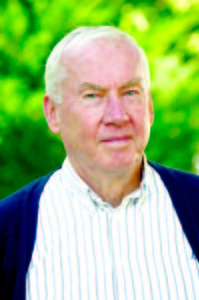Small World: When memory fails us
By Henry Precht
BN Columnist
I’ll call him Joe. He’s one of my oldest friends. (I almost used the past tense.) We go back over 50 years when we worked together in a government department in Washington. Joe was a sharp, thoughtful lawyer, kind, generous and respected by all who knew him — from the time-servers to men whose pay grades were much higher than ours.
I had none of his celebrated qualities. Yet, we were close. He was single and spent a fair amount of time with my family, later becoming godfather to one of our children. Eventually, we both moved to other jobs, Joe to become a successful stockbroker with a local investment firm. Then, I went overseas. He married and moved south to manage his own investments. That meant our relationship came to depend on Christmas letters, occasional notes or an overnight visit when we drove through Joe’s area. We were still close; we just didn’t see each other as regularly.
A few weeks back, I wrote Joe an e-mail to ask about propagating day lilies. (He was an enthusiast and president of the local day lily society.) He didn’t respond and I couldn’t reach him by telephone. So, I sent my message through the postal mail. Joe’s wife Carol replied with a long e-mail. Joe, she wrote, had long been suffering from progressive dementia. It started slowly, but has reached an advanced stage. The doctor, who prescribed his medicine, said the drugs might slow but could not alter the progress of the disease. Joe, Carol wrote, could no longer remember me.
He could recall their three grown children when they telephoned from their distant homes. Carol refused to let him drive. She had not realized that he was seriously afflicted until grave damage had been done to their finances. Joe always handled the money and he had let things slip. They might have to sell their home. How would they manage the special care that Joe would soon require?
I don’t know when a friend’s misfortune has hit me as hard. Some of our friends have Alzheimer’s, but I have been witness to their steady decline over a long period of time. Some have had strokes that affected their speech or caused other physical impairment, but their personalities remained intact. Joe’s dementia comes as a great shock. It is as if he died but, yet, lives on. Carol says he looks the same and is in good shape. He is, however, a ghost of himself. Joe’s spirit will not die; it survives in the hearts of his friends. I’ll illustrate with a short story.
Joe’s father was a Greek immigrant who ran a modest restaurant in a small Nebraska town. People seemed to like the change from steak and corn to spinach pie and egg with lemon soup. He prospered. Then, one night his place was entered and meat was stolen from the refrigerator. It happened again and again. Joe’s father had enough. After closing one night, he mopped the floor and balanced the pale of dirty water on the barely opened back door.
The thief entered, the bucket fell and drenched him. Joe’s father heard the clamor and ran down from his apartment over the restaurant. He knew the thief, a young farm hand who had been a customer, but was down on his luck because of drinking. Joe’s father didn’t call the police. He told the thief to come by late every Wednesday and Saturday night and have the special on the house, then mop the floor after closing. After awhile the ex-thief found another farm job, thanked Joe’s father and started his life again.
Joe was like his father: thoughtful, careful and motivated by good will, kindness and respect.
Henry Precht is a retired Foreign Service Officer.


